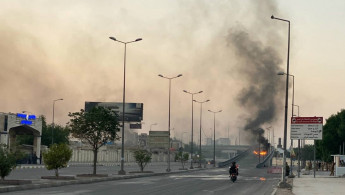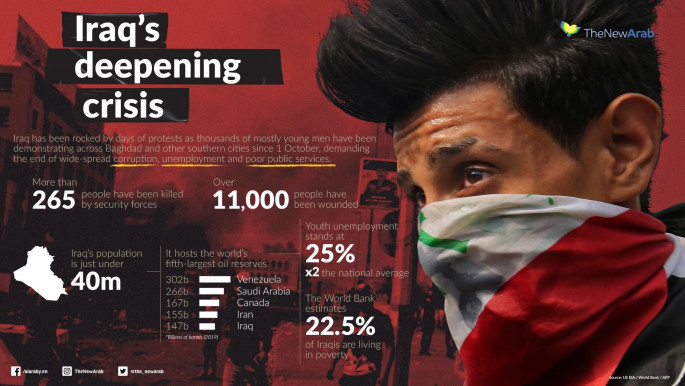The latest bloodshed occurred as the ongoing demonstrations showed no sign of abating, with hundreds rallying across the country waging a campaign of civil disobedience, including roadblocks and general strikes, calling for the end to the Iraqi government's rampant corruption and clientelism.
Read more: 'Our youth are being shot at': Iraq's protests in pictures
Dozens were wounded in Baghdad by bullets and tear gas, after security forces opened fire on crowds advancing across one of the city's main bridges towards the state television and radio headquarters.
Security forces dispersed people as they came within 500 metres of the prime minister's office, located just outside the heavily fortified Green Zone.
As the protesters neared the government buildings, large numbers of security forces flooded into the area.
Protesters have been trying to breach barricades on bridges leading to the heavily fortified Green Zone, where the government is headquartered.
Security forces have fired tear gas and rubber bullets to keep them away from barricades on the nearby Al-Jumhuriyah and Al-Sanak Bridges, but they broke through the barricade on the Al-Ahrar Bridge further north on the Tigris River.
Protesters also burned tyres to block off the al-Alawi bridge in central Baghdad.
Groups of protesters also set fire to a building in central Baghdad, according to a government statement, adding that they were being extinguished by the civil defense.
It was the first time live ammunition was fired at demonstrators in Baghdad since protests resumed on 24 October, following a period in which riot police had switched to use tear gas amid accusations of "excessive force".
At least 265 people have lost their lives since the anti-government rallies broke out on 1 October, according to a medical source.
'Intent to kill'
Overnight, a crowd of protesters had gathered in Karbala around the consulate of neighbouring Iran, which they accuse of propping up the government they are trying to overthrow.
They scaled the blast walls and aimed fireworks at the building and, as the crowd grew, heavy gunfire and volleys of tear gas rang out.
"They're not firing up in the air. They intend to kill, not disperse," said one young protester wearing a medical mask about Iraqi forces guarding the mission.
The forensic medicine department later confirmed four protesters died after being shot.
"My son went out to protest with the rest of the young Iraqi men and got shot once in the shoulder and a second time in the head. He was 20," said Wissam Shaker.
Another relative of a casualty, who declined to give his name, said the protesters had been unarmed.
"If the governor comes out and says these protesters had grenades or weapons, he's lying! They had nothing but stones while security forces fired bullets," he said.
Civil disobedience
Iraq has close but complicated ties with its eastern neighbour Iran, with whom it fought a deadly war in the 1980s but which now has significant political and economic sway in Iraq.
Tehran has sought to reduce the protests next door, with sources reporting top commander Qassem Soleimani making several visits to "advise" Iraqi authorities on coping with the rallies.
Iran's supreme leader Ayatollah Ali Khamenei has also slammed the protests in Iraq and Lebanon, labelling them conspiracies by the US and others.
In-depth: Desperate Iraqi youth renew protests in unyielding attempt to reclaim their homeland
Undeterred by the latest violence, protesters pushed on Monday with civil disobedience tactics they have increasingly adopted over the past week, including sit-ins, road closures and strikes.
The national teachers' syndicate was the first to impose a nationwide strike, shutting down schools across the country, and other trade unions later joined in.
Government offices in more than a half-dozen cities in Iraq's south have been either stormed or closed for lack of staff, with demonstrators hanging banners reading "Closed by order of the people" in front of the buildings.
Others have erected checkpoints to stop security forces or imposed curfews on officials and police, with roads cut in Samawa and protests in Nasiriyah and Hillah on Monday.
PM's support frays
Protesters have also shut the highway to the Umm Qasr port, one of the main conduits for food, medicine and other imports into Iraq.
In Amara, sit-ins were underway Monday at the Halfaya and Buzurgan oil fields, blocking employees from accessing the site but not interrupting production.
The spreading non-violent actions defied a plea the previous evening by embattled premier Adel Abdel Mahdi for protesters to end their campaign.
"Now is the time for life to go back to normal," Abdel Mahdi, 77, said in a statement, insisting that many of their demands "have already been satisfied".
Abdel Mahdi has announced hiring drives and increased social welfare, while President Barham Saleh has proposed early elections after a new voting law is agreed.
But protesters have demanded an overhaul of the entrenched political class and deep-rooted change to end rampant corruption they charge is holding the country back.
Despite being OPEC's second-largest crude producer, one in five Iraqis live below the poverty line and youth unemployment stands at 25 percent.
Follow us on Twitter and Instagram to stay connected






 Follow the Middle East's top stories in English at The New Arab on Google News
Follow the Middle East's top stories in English at The New Arab on Google News

![22 Arab countries at COP29 have rejected the targeting of fossil fuels [Getty]](/sites/default/files/styles/image_330x185/public/2024-11/GettyImages-2184289638.jpg?h=199d8c1f&itok=ptHl5bec)
![Dozens of people turned out for the funerals [Getty]](/sites/default/files/styles/image_330x185/public/2024-11/GettyImages-2185229760.jpg?h=e7c891e8&itok=1bctDcE6)